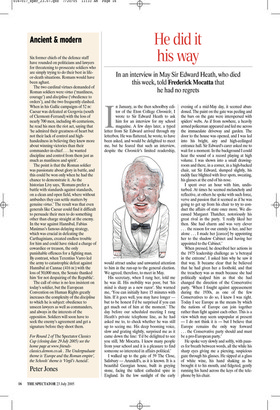Ancient & modern
Six former chiefs of the defence staff have rounded on politicians and lawyers for threatening to prosecute soldiers who are simply trying to do their best in lifeor-death situations. Romans would have been aghast.
The two cardinal virtues demanded of Roman soldiers were virtus (‘manliness, courage’) and disciplina (‘obedience to orders’), and the two frequently clashed. When in his Gallic campaigns of 52 BC Caesar was defeated at Gergovia (south of Clermont-Ferrand) with the loss of nearly 700 men, including 46 centurions, he read his men the riot act, saying that ‘he admired their greatness of heart but not their lack of control and highhandedness in believing they knew more about winning victories than their commander-in-chief ... he wanted discipline and control from them just as much as manliness and spirit’.
The point is that the Roman soldier was passionate about glory in battle, and this could be won only when he had the chance to demonstrate it. As the historian Livy says, ‘Romans prefer a battle with standards against standards, on a clean and open field, where without ambushes they can settle matters by genuine virtus.’ The result was that even generals like Caesar could find it difficult to persuade their men to do something other than charge straight at the enemy. In the war against Hannibal, Fabius Maximus’s famous delaying strategy, which was crucial in defeating the Carthaginians, created endless trouble for him and could have risked a charge of cowardice or treason, the only punishable offences for a fighting man. By contrast, when Terentius Varro led the army to catastrophic defeat against Hannibal at Cannae (416 BC) with the loss of 50,000 men, the Senate thanked him ‘for not despairing of the Republic’.
The call of virtus is no less insistent on today’s soldier, but the European Convention on Human Rights greatly increases the complexity of the disciplina to which he is subject: obedience to unseen lawyers as well as commanders, and always in the interests of the opposition. Soldiers will soon have to seek the enemy’s agreement and get a signature before they shoot them.
Peter Jones
For Round 2 of The Spectator Classics Cup (closing date 29 July 2005) see the home page at www.friendsclassics.demon.co.uk . The Undergraduate theme is ‘Europe and the Roman empire’, the Schools’ theme is ‘Virgil’s Aeneid’.















































 Previous page
Previous page